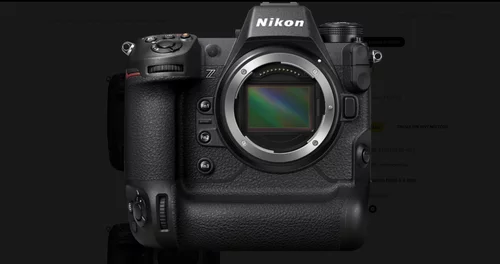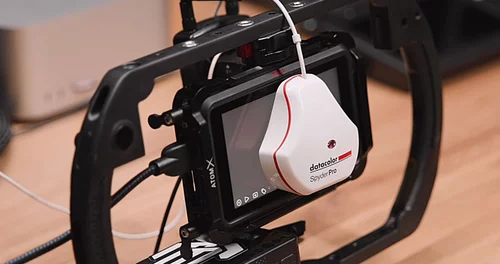Frage von Jörg:Von Fujirumors
https://www.fujirumors.com/panasonic-un ... mic-range/
Panasonic Unveils 35MP Organic Super35 CMOS Sensor with Global Shutter and Great Dynamic Range
October 30, 2021 News 3 Comments
The organic sensor has reached a mythical status.
In fact, 8 year after the joint Panasonic and Fujifilm announcement, where the organic sensor was first unveiled to the masses with great optimism and claims of glorious performances and dynamic range, we haven’t seen anything coming to the market, expect for a camcorder prototype shown by Panasonic back in 2019.
Probably like many of you, I just stopped hoping that such a sensor would ever see the light of the day.
And yet, today we have to add another chapter to the organic sensor novel.
In fact, Panasonic has just announced the first 4k/8K Super35 global shutter organic CMOS sensor during the “4th 4K / 8K Video Technology Exhibition”
Here are Panasonic’s claims (google translated):
replaces the silicon photodiode that has been used as the light receiving part of the conventional CMOS sensor with an organic thin film that has a larger light absorption coefficient
wide dynamic range and global shutter
In a general back-illuminated CMOS sensor, if a high resolution and a wide dynamic range are realized, a global shutter cannot be installed, and if a global shutter is installed, the resolution and the dynamic range are reduced, which is a trade-off
The organic CMOS sensor has a dynamic range four times that of a general CMOS sensor
the global shutter also adjusts the voltage applied to the organic thin film to control the photoelectric conversion efficiency
technological development for practical use is making great progress
color reproducibility is high
As a next-generation technology for organic CMOS sensors, there is an ultra-WDR technology in which two sensitivity detection cells, a high-sensitivity cell and a high-saturation cell, are provided in one pixel.
With this, the dynamic range can be 100 times that of an organic CMOS sensor and 400 times that of a general CMOS sensor.
Well, we knew about all the dynamic range claims and the global shutter already. Today we got a bit more insights on how it works and especially one sentence revived my hopes after all these years:
technological development for practical use is making great progress
So let’s hope that we will soon see the first cameras with such a sensor and that they were able to sort out the main problems with this sensor: heat generation and battery drain.
Will this be the sensor of the Fujifilm X-H2?
I don’t know, but I don’t think so.
Maybe it will initially find its way into larger bodies of camcorders, which can handle heat generation better. At a later stage maybe also mirrorless cameras will feature this sensor.
Antwort von roki100:
Maybe bald in GH6?
Antwort von cantsin:
roki100 hat geschrieben:
Maybe bald in GH6?
Ist ein APS-C-Sensor...
Antwort von roki100:
insgeheim haben die vll. auch nen MFT-Sensor für die GH6 vorbereitet, denn es wurde ja von einem neuen Sensor erzählt (mit Global Shutter?) der in GH6 verbaut ist... abwarten. :)
Antwort von Darth Schneider:
…die Mikro4Looser Gh6 sich dann fast niemand kaufen wird, falls Sie überhaupt noch kommt ?
Und die Info mit dem Global Shutter kam doch ursprünglich glaube ich von Olympus, (nicht von Panasonic), beziehungsweise heute heissen die ja OM…
Die Gh6 kann ja auch eigentlich gar kein Super 35 Sensor haben, ausser sie vergrössern den Sensor und den Mount..;)))
Jede Wette der neue Panasonic Sensor kommt dann in die SH2, oder/und in die S6.
Gruss Boris
Antwort von mash_gh4:
"Darth Schneider" hat geschrieben:
Die Gh6 kann ja auch eigentlich gar kein Super 35 Sensor haben, ausser sie vergrössern den Sensor und den Mount..;)))
prinzipiell schließt ein MFT-mount die nutzung eines s35-sensors nicht unbedingt aus, wie es am bsp. der JVC
GY-LS300CH auch bereits ganz praktisch vorgeführt wurde.
trotzdem würde ich weder von panasonic noch von olympus erwarten, dass sie diesen weg beschreiten, obwohl ich einen solchen schritt durchaus begrüßen würde.
Antwort von Darth Schneider:
Wobei es wird immer mal wieder was über einen neuen Super Bildwandler geschrieben, der dann einfach nie kommt…Das selbe mit den ständig angekündigten Super Akkus die man ebenfalls nie kaufen kann…
Also da oben steht was von 4x mehr Dynamik Range als ein bisheriger CMOS Sensor.
Das kann ich irgendwie nur schwer glauben, das tönt schon mal eher nach einem Wunschtraum als Realität.
Und weiter unten geht es dann noch realistischer weiter. Mit der nächsten Organic Sensor Generation mit dann 100 bis 400 mal mehr Dynamik Range, als die heutigen Sensoren ???
Jetzt mal im Ernst, glaubt das jemand von euch wirklich ?
Das tönt wie ein Aprilscherz…
Gruss Boris
Antwort von cantsin:
"Darth Schneider" hat geschrieben:
Also da oben steht was von 4x mehr Dynamik Range als ein bisheriger CMOS Sensor.
Das kann ich irgendwie nur schwer glauben, das tönt schon mal eher nach einem Wunschtraum als Realität.
Das bezieht sich vermutlich auf die linearen Sensorwerte und bedeutet, dass der Sensor 4 Blenden mehr Dynamikumfang hat als ein konventioneller CMOS-Sensor.
Da ist natürlich die Frage, welche Sensoren als Vergleich herangezogen werden. Wenn das ein Sensor wie z.B. der der Canon R5 ist, dann sprechen wir wahrscheinlich von 14 ggü. 10 nutzbaren Blenden Dynamikumfang.
Antwort von Darth Schneider:
Also eine Gh6 mit Super35mm Sensor mit MFT Mount und Global Shutter wäre jetzt schon eine sehr, sehr coole Ansage…
Für um die 2500€. Ich denke dann würde ich schwach werden….;)
Wobei, sind die 32MP nicht etwas zu viel zum filmen ?
Gruss Boris
Antwort von cantsin:
"Darth Schneider" hat geschrieben:
Also eine Gh6 mit Super35mm Sensor mit MFT Mount und Global Shutter wäre jetzt schon eine sehr, sehr coole Ansage…
Für um die 2500€. Ich denke dann würde ich schwach werden….;)
In der aktuellen Slashcam-Meldung steht, dass der Sensor hohen Strom- und Kühlungsbedarf hat. Wahrscheinlich ist er auch teuer in der Herstellung. Das spricht dafür, dass er - wenn überhaupt - in Kameras wie z.B. der Varicam35 eingebaut wird, deren Gehäuse und Stromversorgung die nötige Kapazität für ein leistungsstarkes aktives Kühlsystem bietet. Die Varicam35 wäre auch vom Sensorformat her passender.






